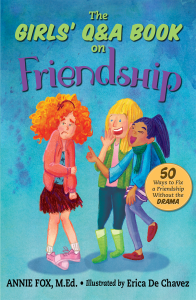Ours is a boob-fixated culture. With so much sexualization of girls in the media you’d assume they’re all dying for their first bra and thong. At least once a week I get email from girls complaining about their “too small” breasts. They want to know if having sex will make them “rounder” or if some cream pitched online will make their breasts grow. But recently I heard from a mom whose daughter was actively resisting the whole “growing-up” thing.
Mom: My 12 year old daughter has started developing breasts and this wouldn’t be problem if she would just wear a shirt or something at our house. But she thinks it’s ok to walk around half naked. Me and my husband have told her she needs to wear something at home, but she’s not listening.
Annie: In 17 years of answering email from parents I’ve not heard this one yet. Just to clarify: Is your daughter just wearing a shirt (without a bra) or is she “walking around half naked?” Not the same thing. If you made a list of your objections to your daughter’s not wearing a bra or a shirt, what would they be? Communicate your objections to your daughter (calmly and respectfully and privately—without your husband being part of this “just between us girls” conversation). Good luck and please let me know how it goes.
Mom: Around the house she refuses to wear even a shirt. I talked with her about why she needs to wear something around the house. (She won’t wear a bra outside the house, but wears shirts.) She is so stubborn. She thinks it’s unfair that girls have to wear bras and shirts all the time and guys don’t. I really don’t want to make her wear something, but I don’t see another option.
Annie: While I admire the strong young feminist you’re raising, she needs to understand what is and what is not appropriate for a 12 year old girl (even at home). No shirt… not appropriate. Tell me, is there a counselor and/or a health/life skills teacher at your daughter’s school? It sounds like you need someone outside the family to talk with your daughter. A female counselor or teacher who has experience working with tweens around puberty and modesty issues would be helpful.
Mom: I will email the counselor today to see what she thinks needs to be done. One bad thing about having a strong young girl is that she will not listen to anyone or anything. That’s why I’m concerned about this. She does what she does no matter if it’s right or wrong.
Annie: Even strong girls needs to learn there are rules and consequences for breaking rules. That’s true for all of us. It’s part of living in a civil society. If, for example, she decided to take her shirt off at school, she’d be disciplined… so in that case she wouldn’t have total freedom to “do what she does.” Good luck with the counselor and please let me know how it goes.
Mom: The counselor thinks my daughter is resisting growing up. That she’s only doing this because she knows she’s maturing into a woman. I can understand that. She told me to make sure my daughter always has a bra on at least because it’s something she needs everyday when she’s older. I don’t think she’ll like me checking her everyday to see if she has a bra on.
Annie: I’m sure your daughter will not appreciate your checking on whether she’s wearing a bra. This doesn’t sound like a good solution as it’s going to become more of a battlefield between you, not less of one. I’d talk to her pediatrician on this one. You need another way to handle this.
Mom: The pediatrician? Never thought of calling her doctor about this.
Annie: Pediatricians can be really helpful in talking to young patients about puberty and their thoughts and feelings about “growing up.”
Mom: Guess she’s just a very unique child then. Pediatrician it is.
Annie: Good luck!
What challenges have you had with your children around growing up and the changes brought on by puberty?
















